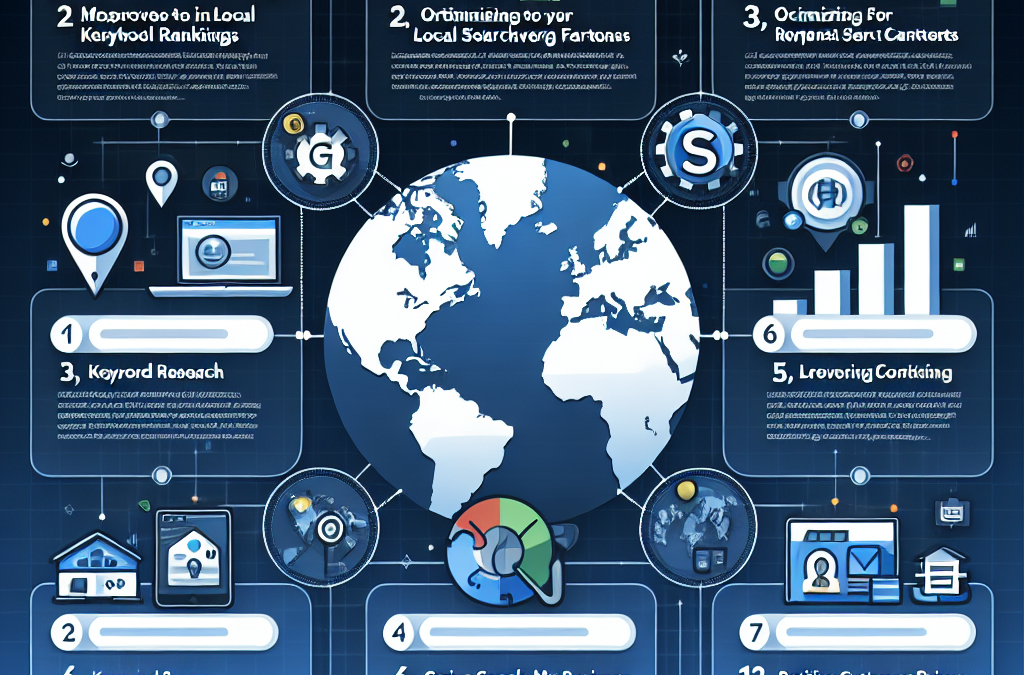Hey there! If you’re ready to boost your local keyword rankings and bring more customers straight to your doorstep, you’ve come to the right place. I’ve been through the ins and outs of local SEO, and I’m here to share what I’ve learned. So, let’s dive into the five key areas that can help elevate your game!
Effective Local SEO Strategy
Building a successful local SEO strategy is like laying the foundation of a strong house – you need to make sure everything is solid so that what you build on top of it can stand tall.
Keyword Research
First off, keyword research is crucial! You’ve got to know what your local audience is searching for. Tools like Google Keyword Planner and SEMrush have been my best friends in figuring out popular search terms. I usually start off by brainstorming relevant keywords related to my business and then digging into the metrics provided by these tools.
Once I have a solid list, I focus on localizing those keywords. For example, if I run a bakery in Seattle, keywords like “Seattle bakery” or “best pastries in Seattle” become my prime targets. This ensures that I’m not just casting a wide net but also snagging those potential customers who are in my area.
Don’t forget to analyze your competition! Checking out what keywords they are ranking for can provide valuable insights into what’s working in your niche, giving you a leg-up when crafting your strategy.
Optimize Google My Business
Google My Business (GMB) is a gem that can’t be overlooked. When I first claimed my listing, I found out just how vital it is for local search visibility. I make sure my profile is 100% complete, updating it regularly with accurate business information – think hours, services, and my location.
A pro tip: keep your photos fresh and appealing! I noticed that listings with high-quality images tend to attract more clicks. Plus, I always respond to reviews – both good and bad – as it shows prospective customers that I care about their experience.
Don’t forget to utilize posts on GMB too! Sharing updates, promotions, or community events has really helped me engage with my audience better and drive even more traffic to my business.
On-Page SEO
Now, let’s talk about on-page SEO. This is where I ensure that my website is optimized for local searches. I start by placing my chosen keywords naturally throughout my web pages, especially in the title tags, meta descriptions, and headings.
I also make sure that my business name, address, and phone number (NAP) are clearly listed on my site. It’s super important for both users and search engines to easily identify where I am located and how they can reach me.
Another essential aspect is creating locally relevant content. I’ve found that writing blog posts related to events happening around my area or sharing stories relevant to my local audience resonates more with my customers and improves my local authority.
Local Link Building
Building local backlinks has been a game-changer in my journey to improve my local rankings. High-quality backlinks from relevant local sources boost my credibility and visibility in search engines.
Networking with Local Businesses
I always look for partnership opportunities with other local businesses. Collaborating on events or workshops has opened doors for mutual benefit, allowing us to share links on each other’s websites and gain exposure. It’s all about creating a community where you can uplift one another!
Another way to tap into local networking is through sponsorships. Whether it’s sponsoring a local sports team or an event, these opportunities can lead to backlinks from their websites, creating a win-win situation.
Don’t shy away from engaging with your local chamber of commerce too! They often have directories or resources where you can get listed, and this can significantly aid in building your local link profile.
Online Directories
Getting listed in relevant online directories is surprisingly impactful. Sites like Yelp, TripAdvisor, and Yellow Pages are great for local visibility. Whenever I list my business, I ensure that all of my information is consistent across these platforms to enhance my credibility.
Updating and maintaining these listings is just as vital because customers rely heavily on current information. If someone sees that I’m well-reviewed in multiple places, it gives them the trust factor they need to choose my business.
Another aspect to consider is specialized directories. Look for directories that cater specifically to your industry. It’s a niche community that can drive targeted traffic my way!
Local Influencer Marketing
Let’s not forget about the power of local influencers! Engaging with local bloggers and social media figures can help spread the word about my business through their established followings.
I usually reach out to them with a collaboration idea or a simple invitation to visit. Once they experience what I offer, they often share their thoughts with their audience, creating natural backlinks and expanding my reach.
By building relationships with these influencers, I not only gain exposure but also sometimes find opportunities for guest posts or shout-outs, which are invaluable to improving my local keyword rankings.
Measure and Analyze Your Results
Finally, measuring and analyzing the results of all my efforts is vital. It’s like checking the scorecard in a game; you need to know if your strategy is paying off!
Analytics Tools
I rely heavily on tools like Google Analytics and Google Search Console to monitor my website’s performance. These platforms provide insights into how users are finding my site, which keywords are driving traffic, and how visitors are interacting with my content.
One particular metric I pay close attention to is the conversion rate. After all, high traffic is great, but what really matters is that I’m converting those visitors into paying customers.
Regularly reviewing this data has helped me adjust my strategy. If I see certain keywords aren’t performing, I don’t hesitate to pivot and explore new options or content ideas that better connect with my audience.
Competitor Analysis
Another layer is keeping an eye on my competitors. Tools like Moz or Ahrefs have been fantastic for this. By understanding what’s working for others in my area, I can identify gaps in my strategy and seize opportunities that may have flown under my radar.
It’s also beneficial to observe their backlink strategies. Knowing where they get their links can sometimes provide the perfect lead for my next outreach or collaboration opportunity.
Ultimately, staying adaptable and willing to learn from both successes and failures will lead to continuous improvement in my local keyword rankings.
Stay Updated with Trends
The digital landscape is constantly changing, and keeping my SEO knowledge up to date is key. I always stay informed about the latest trends and algorithm updates, as they can drastically affect my rankings.
Follow Industry Leaders
Following industry leaders on social media or blogs has enriched my understanding significantly. Their insights often spotlight emerging trends or strategies worth trying, and I’ve discovered new tools that have streamlined my processes.
Participating in webinars or online workshops is another gold mine of knowledge. I make it a point to engage with these events whenever I can – it’s amazing how much you can learn in just an hour or two!
Joining local SEO groups or forums is also a way to stay connected with peers who are going through similar challenges. Sharing experiences and techniques helps everyone level up their game together!
Expand Your Knowledge
Reading case studies has been eye-opening. They showcase real-life applications of strategies, providing tangible results and lessons learned. I often find ideas I hadn’t previously considered but that can be pivotal for my business.
I also take time each month to reassess my goals. Am I monitoring the right KPIs? Are the strategies I’m implementing still relevant? This kind of reflection has consistently led me to tweak and improve my methods.
In a nutshell, staying informed means I can address changes proactively rather than reactively. And trust me, that’s a game-changer in local SEO!
FAQs
- What is local keyword ranking?
- Local keyword ranking refers to how well a business’s website or online listing performs in search results for specific keywords related to its location. It’s crucial for attracting local customers.
- Why is Google My Business important?
- Google My Business is vital because it helps businesses appear in local search results when users search for products or services in their area, providing critical information like operating hours, location, and reviews.
- How can local backlinks improve my SEO?
- Local backlinks signal to search engines that your business is relevant and trustworthy within your community. This can significantly enhance your authority and improve your search rankings.
- What tools can I use for measuring SEO performance?
- Tools like Google Analytics, Google Search Console, and SEMrush are popular choices for tracking website performance, identifying traffic sources, and analyzing ranking changes over time.
- How often should I update my GMB listing?
- You should update your Google My Business listing whenever there’s a change in information, such as operating hours, new services, or promotions. Regular updates keep your listing relevant and engaging for potential customers.
That’s a wrap on improving your local keyword rankings! I hope this article helps you navigate your local SEO journey more effectively. Feel free to reach out with any questions you might have – let’s grow together!


